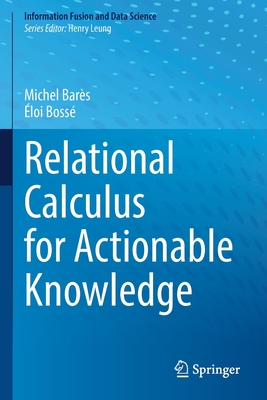Relational Calculus for Actionable Knowledge
暫譯: 可行知識的關聯演算
Barès, Michel, Bossé, Éloi
- 出版商: Springer
- 出版日期: 2022-01-22
- 售價: $4,610
- 貴賓價: 9.5 折 $4,380
- 語言: 英文
- 頁數: 362
- 裝訂: Hardcover - also called cloth, retail trade, or trade
- ISBN: 3030924297
- ISBN-13: 9783030924294
-
相關分類:
Information-management
海外代購書籍(需單獨結帳)
相關主題
商品描述
Chapter 2 Knowledge and its Dimensions 2.1 Introduction 2.2. Knowledge Systems 2.2.1 Knowledge Item, Unit, Quantum, and Element 2.2.2 Epistemic (knowledge) Structures and Spaces 2.2.3 Domain Knowledge and Knowledge Object 2.2.4 Semiotic bases of an 'infocentric' knowledge pipeline 2.2.5 Representation of knowledge 2.3. The multidimensionality of knowledge 2.3.1 Dimensions and characteristics of knowledge 2.3.2 Knowledge correctness2.4. Meaning of knowledge: the semantic dimension 2.4.1 Production of sense 2.4.2 The semantic traits or semes 2.4.3 Sense and Action 2.4.4 Connotation and denotation 2.4.5 Representations and manipulations of sense 2.5 The temporal dimension of knowledge 2.5.1 Temporal dimension and "signified' 2.5.2 Temporal dimension validity 2.6 The ontological dimension of knowledge 2.6.1 On tracing 'notions' in an ontology 2.6.2 Domains of objects 2.6.3 Implementing the ontological dimension 2.6.4 Contextual information and knowledge 2.7 Conclusion
Chapter 3 The Knowledge Chain 3.1 Introduction 3.2 Semiotic basis 3.3 Data, Information, and Knowledge 3.3.1 What is data? 3.3.2 What is information? 3.3.3 What is knowledge? 3.3.4 Relationships between information, data, and knowledge. 3.3.5 Semantic status 3.4 Quality of Information (QoI) in the Knowledge Chain 3.4.1 Questions related to quality of information 3.4.2 Evaluation of quality of information 3.4.3 Frameworks to evaluation of quality of information 3.4.4 A guided tour of books on data and information quality 3.4.5 On information quality ontologies 3.5 A need for formalization 3.5.1 Logical propositions 3.5.2 Propositional transformations 3.5.3 Predicate logic formalization 3.5.4 Formalization by graphical representations 3.6 Knowledge reference dimension: the use of quantification 3.6.1 Order and scope of the quantification of a referent 3.6.2 Application of quantification to referents 3.6.3 Relational predicate applied to referents 3.6.4 Converse property of a relational predicate 3.6.5 Reflexivity property of a relational predicate 3.6.6 Symmetry and asymmetry properties of a relational predicate 3.6.7 Negation property of a relati
商品描述(中文翻譯)
第一章 可行知識導論:概念與定義
1.1 可行知識
1.2 我們的世界:網路物理與社會系統 (CPSS)
1.3 社會行為面對知識與資訊
1.4 資訊情境
1.5 結構與知識結構
1.5.1 符號與標誌
1.5.2 概念、名稱與物件
1.6 精通與改善知識
1.6.1 朝向更好的知識掌握
1.6.2 普遍性與知識掌握
1.7 可行知識與決策支持
1.7.1 CPSS中的決策支持
1.7.2 分析與資訊融合 (AIF)
1.7.3 情境意識與可行知識
1.8 本書結構
第二章 知識及其維度
2.1 介紹
2.2 知識系統
2.2.1 知識項目、單位、量子與元素
2.2.2 認識論 (知識) 結構與空間
2.2.3 領域知識與知識物件
2.2.4 以「資訊為中心」的知識管道的符號學基礎
2.2.5 知識的表徵
2.3 知識的多維性
2.3.1 知識的維度與特徵
2.3.2 知識的正確性
2.4 知識的意義:語義維度
2.4.1 意義的產生
2.4.2 語義特徵或語義單位
2.4.3 意義與行動
2.4.4 內涵與外延
2.4.5 意義的表徵與操作
2.5 知識的時間維度
2.5.1 時間維度與「所指」
2.5.2 時間維度的有效性
2.6 知識的本體論維度
2.6.1 追溯本體中的「概念」
2.6.2 物件的領域
2.6.3 實施本體論維度
2.6.4 上下文資訊與知識
2.7 結論
第三章 知識鏈
3.1 介紹
3.2 符號學基礎
3.3 數據、資訊與知識
3.3.1 什麼是數據?
3.3.2 什麼是資訊?
3.3.3 什麼是知識?
3.3.4 資訊、數據與知識之間的關係
3.3.5 語義狀態
3.4 知識鏈中的資訊質量 (QoI)
3.4.1 與資訊質量相關的問題
3.4.2 資訊質量的評估
3.4.3 資訊質量評估的框架
3.4.4 數據與資訊質量書籍的導覽
3.4.5 關於資訊質量本體論
3.5 形式化的需求
3.5.1 邏輯命題
3.5.2 命題轉換
3.5.3 謂詞邏輯的形式化
3.5.4 透過圖形表示的形式化
3.6 知識參考維度:量化的使用
3.6.1 參照物的量化的順序與範圍
3.6.2 量化在參照物上的應用
3.6.3 應用於參照物的關係謂詞
3.6.4 關係謂詞的對換性質
3.6.5 關係謂詞的自反性質
3.6.6 關係謂詞的對稱性與非對稱性質
3.6.7 關係謂詞的否定性質











